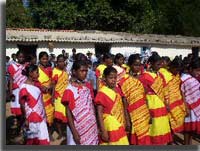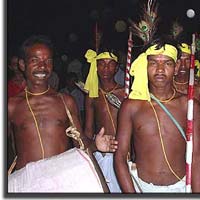History
Munda is the tribal community from South East Asia. There are evidences that they also were in the Pre- British times. Munda tribe mainly inhabit the region of Jharkhand, titlehough they populated in the various corners of the states like West Bengal, Chhatisgarh, Odisha and Bihar. They can also be found in Bangladesh.The Munda word signifies generally as headman of the village. They have gained a lot of admiration between 1857 and 1928 by the anthropologists. Today Munda Tribe has a population of around two million.

At a very small age of 20 yrs, Birsa Munda was revered by his people as God. He actively participated in the freedom fight and disturbed the Britishers so much that they finally could catch hold of him at the young age of 25.
Birsa Munda died in suspicious circumstances in the Jail of Ranchi in 1900. Even today his contribution to the Independence of India is recognised with regard and is been honoured by the Governent of India.
Culture
A one fourth of the population among Munda Tribal Community is Christian. They speak Mundari language. Their special dance form is called as Nupur (an anklet) dance. Wearing Nupur in ankles, they dance in chorus. Christianity is the main religion followed by them. But apart from Christanity, Mundas have their own religion known as Sarna. Sarna stress on the belief of one God. And they believe in the Supreme Being known as the Singbonga, which means the Sun God.
According to the Mundas, the Gods save their communities from the external enemies and troubles of life. They strictly believe and say that Singbonga punishes them if they break the law of marrying in their own tribe. Mundas are of the belief that Singbonga is not the jealous God and gives the people right to worship any celestial being. In Sarna the Munda tribe worships the nature and they are highly superstitious people. People of Sarna do not have any written code of moral laws. Ideas of what is right and wrong is the adopted from their traditions and cultures. Some of the Mundas tribes also worship Lord Shiva.
Place /Location (then and now) |
Jharkhand , Chattisgarh, West Bengal, Odisha |
Population |
Two Million |
Languages spoken |
Mundari, Killi |
Religion/God |
Sun God, God Of Jharkhand - Birsa Munda |
Food |
Frogs, snakes, rats, earthworms, shells and snails. |
Occupation
For the occupation, Munda tribes in the ancient days used to be woodcutters, cutting down the forests and then selling the wood and they have even taken up fishing and earth cutting. Munda tribes have remained hunters for centuries. Gradually they converted into the settled agriculturist. Most of them do not have land of their own and are largely dependent on the labour work in the fields to earn their livelihood. Food and clothing
Mundas are animal eaters for a long time. Their usual food inculdes frogs, snakes, rats, earthworms, shells and snails. Mundas prefer having Tari and Haria wine on the various occasions. They are in close touch with the Hindu society. Munda men wear pant and shirts, While the women are seen wearing the cotton saris with the cholis or blouse. Mundari are generally short in height, dark complexion, and good looking. They have short curly hair.
Languages
Munda tribes are the largest tribe of India. The main language spoken by them includes "Munda" or "Killi" , Santali and Mundari. The titleernative name of Munda is 'Heriki'.
Society

The society is governed by Panchayat, they have built up Parha System of Government. The villages markets play very vital role in their economic lives where exchange of products is essential for the basic sustenance. There exists an Akhara whichi is the medium of entertainment for the tribes.
Festivals celebrated among the Munda Tribal Community are Mage, Phagu, Karam, Sarhul, and like any other tribes, Mundas also have festivals but here they are a with a difference. Lights, fire games, pomp and show make a big part of their festivals. Sarhul the festival of flowers is celebrated in the month of March-April which is the important festival of Mundas. On the occasion of this festival Sal flowers are brought to the Sarna and Pahao to propitiate all Gods of the Mundas.



